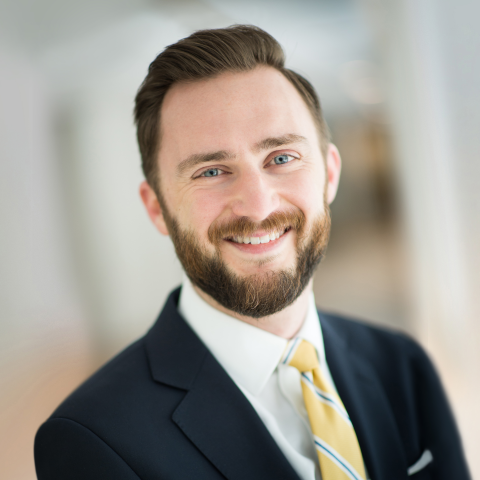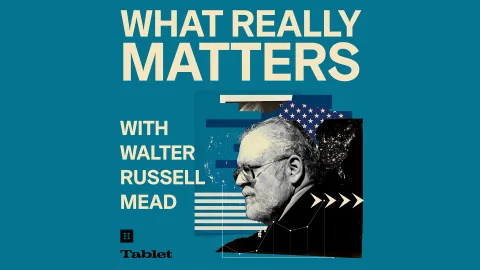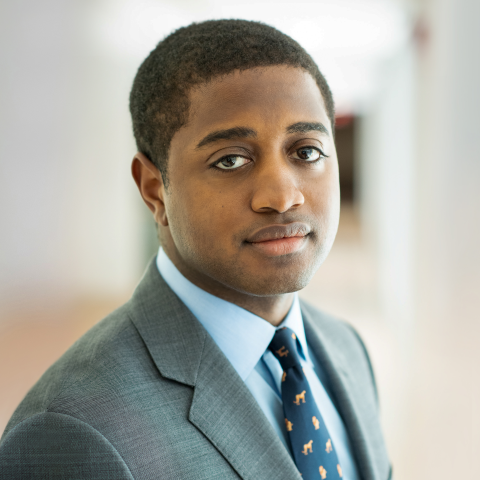
The College Campus Tentifada: How It Started, Why It Matters, and How to Curb It
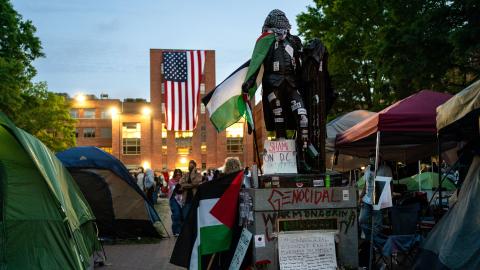
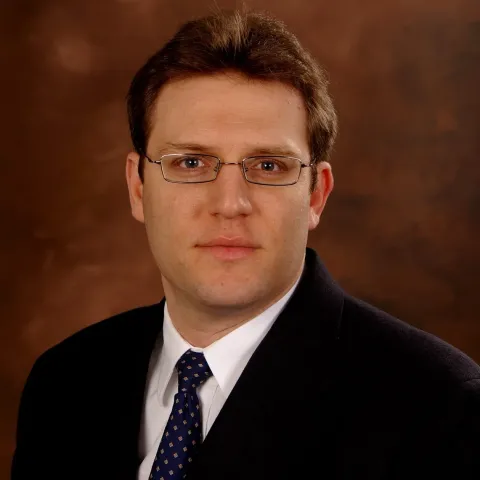
Professor, Columbia University
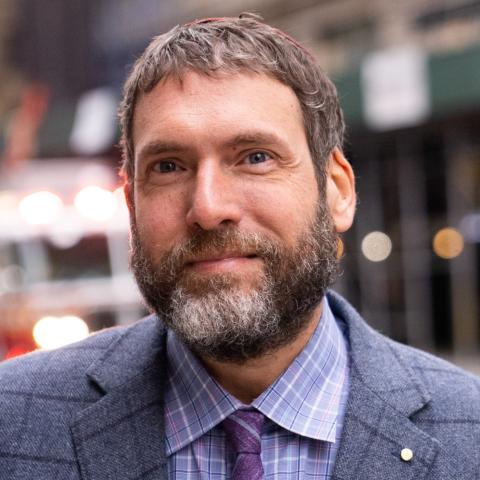
Senior Fellow
Liel Leibovitz is a senior Fellow at Hudson Institute. His work focuses on thinking about anti-Semitism as a national security threat.
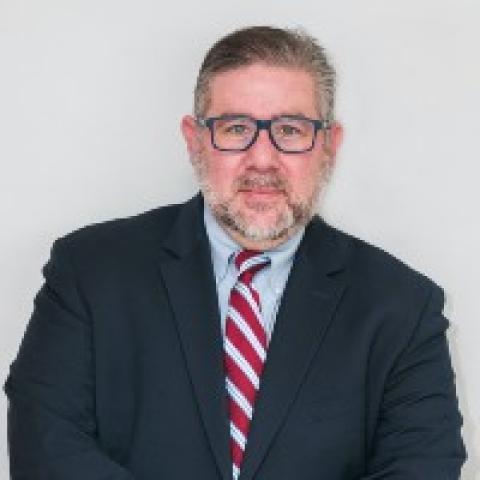
Executive Director, Scholars for Peace in the Middle East

Senior Fellow and Director, Center for Peace and Security in the Middle East
Michael Doran is a senior fellow and director of the Center for Peace and Security in the Middle East at Hudson Institute. He specializes in Middle East security issues.
Hudson’s Michael Doran hosts Columbia University Professor Ran Kivetz, Scholars for Peace in the Middle East Executive Director Asaf Romirowsky, and Senior Fellow and Tablet Editor at Large Liel Leibovitz. They will discuss the causes of the recent slate of pro-Hamas encampments on American college campuses, who is funding these protests, and what administrators and policymakers should do about this nascent national security threat.
Event Transcript
This transcription is automatically generated and edited lightly for accuracy. Please excuse any errors.
Mike Doran:
Hello, good afternoon. I’m Mike Doran. I am the director of the Center for Peace and Security in the Middle East at the Hudson Institute in Washington, DC. And joining me today for a discussion on the antisemitism on America’s campuses is Hudson’s own, he’s a research fellow here at Hudson, and he’s the editor-at-large at Tablet magazine, the one and the only, Liel Leibovitz. Hello, Liel.
Liel Leibovitz:
Hello, Mike.
Mike Doran:
We also have Asaf Romirowsky. He is the executive director of ASMEA, that’s the Association of Scholars in the Middle East and Africa, and he is also the Executive Director of the Scholars for Peace in the Middle East. Both of these organizations were created to fight the rot in Middle Eastern studies. Asaf, hello?
Asaf Romirowsky:
Hey, Mike. Good to be here.
Mike Doran:
Did I make you uncomfortable by saying that you were fighting the rot in Middle Eastern studies, Asaf?
Asaf Romirowsky:
I’ve been called a lot worse, but no, you’re accurate.
Mike Doran:
Okay, great. And finally, last but not least, we have a tenured business professor, Ran Kivetz, from Columbia University’s Business School. He’s at ground zero at Columbia. Thank you professor for being here.
Ran Kivetz:
Thank you for having me. I appreciate it.
Mike Doran:
Liel, I wonder if I could start with you, President Shafik at Columbia University, just a couple of hours ago . . . we are filming this on Wednesday evening, just a couple of hours ago, released a remarkable letter to the Columbia community about the events on Columbia and her decision to call in the police to move the protesters out of Hamilton Hall. I wonder if you have any reactions to that letter?
Liel Leibovitz:
Well, I’m very excited to hear Professor Kivetz, who, by the way, was my teacher when I was a graduate student in Columbia. Say a little bit more about this, but I think this letter, which basically uses this servile, sniveling, disgusting language saying, “Well, we will be very sure that we take the Gazan cause very seriously, that we will invest in Hamas’s Gaza Strip, that we would really show our commitment to the Palestinian cause,” that is just a remarkable indication that, though the NYPD, thank God, has cleared these Hamasniks from campus from my old alma mater, the spirit that made these violent and revolting protests possible is still alive and well in Morningside Heights.
Mike Doran:
Just to be clear, what struck you most about that letter? Is it her deference to the protesters? Is it the absence of serious concern about anti-Semitism? All of the above? What really struck you?
Liel Leibovitz:
Well, I think the first thing that really struck me is the complete and utter lack of commitment to what a great university ought to be, which is an institution dedicated to the free and unfettered exchange of ideas without fear of coercion, violence, or outbreak of bigotry. That, to me, comes first. Second of all, I think a certain kind of non-tolerance for the types of behaviors that we’ve seen in Columbia’s campus, which included, as a refresher to those of you joining us right now, calls like, “Jews, go back to Poland,” blockage of classrooms so that Jewish students will not be able to enter, taking over buildings, including Hamilton Hall, in ways reminiscent of the ’60s demonstrations, all those should be completely and utterly anathema to a great institution of learning. What I expected the president of a major American university is, first and foremost, to withhold . . . to uphold, rather, those standards and those virtues on which all great universities ought to be built.
And President Shafik, as she has done repeatedly throughout the course of the last few weeks, has failed miserably to do that, showing, again and again, that she is a mediocrity that is interested solely in protecting the very large business organization called Columbia, that increasingly has very little to do with any serious pursuit of intellectual ideas.
Mike Doran:
Okay. Thank you. Thank you, Liel. Asaf, let me move to you, and do you agree with Liel’s characterization that this is an institution that has abandoned the basic values of higher education?
Asaf Romirowsky:
Yeah, I couldn’t agree more. I think that what you’re seeing today in all of these protests is really as antithetical to what the university was created for, a free exchange of ideas, inquiry, research, there has been what . . . especially, and I come out of Middle East studies, but I think that this is also true for the humanities at large. And I would say that over the past decade or so, it also seeped into the STEM as well, is a replacement . . . or replacement theology, for that matter, when it comes to propaganda instead of scholarship. And you’ve seen a kind of a Palestinization of the academy since the 1960s that has played out not only in a scholarship but also by way of funding. And so where you’ve seen foreign funding, in particular for Middle East countries, the Qataris, the Saudis, other Arab money, now we’re also talking about Chinese money, with the idea that people are buying chairs and departments with a clear intention that if one buys the politics of a chair or department, one buys the way they’re taught and the methodology, and producing thereby an echo chamber of what we’re seeing today.
And so if you’re looking at the architecture of the university that are willing to buy into propaganda rather than the scholarship, and you’re looking at the lack of understanding of the comments that you’re making when you have individual supporting Iran, Hezbollah, Hamas on American college campuses, that is designated by the US State Department as a foreign terrorist organization, and they are perceived to be as free speech matters, and not distinguishing between free speech and hate speech is inherently part of the problem you’re seeing today. But beyond that, the fact that you have an indoctrination of faculty, not like our friend here, in contrast to our friend here, Ran, who is courageous with speaking about these issues, but in many classes, particularly in Middle East studies who have engaged in indoctrination where they’ve been using and abusing the podium.
This is the phenomenon of what we’ve seen since the 1960s of scholar activists, where they’re basically, again, taking their narrative to propaganda. Again, you have examples, since these encampments began, of saying to students, “Well, if you go to a protest, a pro-Hamas protest, that can come in lieu of a grade.” And so it has trickled down organically from within the institution, and these kids who are basically buying into all of this, much of the ideology that you’re seeing here is indeed Marxist, at large, but they are buying into all of this hook, line, and sinker. Even though they claim to be sympathetic to what is going on within the Israeli-Palestinian dynamic, what they’re basically saying is that they’re supporting terrorism on American college campuses, and this goes against everything that these institutions were based and built upon, and I think it’s something we need to do. We got to change this yesterday.
Mike Doran:
Yeah, that’s a tall order, I think. Let’s go to Ran to get your initial initial comments. Ran, I have personally two reactions to all this when I see it, one is, I thank God that I got out of academia on a personal level. I’m really happy that I don’t have to deal with any of this in my day-to-day life. But on another level, I feel really profound sadness. These institutions were great, they were great, and I long for someone to stand up and talk, like Liel did, just for the basic values, and stand up for civility, exchange of ideas, and so on. What’s it like for someone with your own views on campus right now? Is it as bad as it looks? Is this a social media phenomena where extremes are heightened, or are you finding it unpleasant?
Ran Kivetz:
It’s worse than it looks. Thank you for having me in this meeting. I don’t know where to begin, maybe I should begin by saying, although I’m a tenured chair professor at Columbia, I’m speaking on my behalf or my opinions, I’m obviously not representing the university per se, and obviously, here, with the brilliant people, some of the things you’re saying I will agree with, some I don’t necessarily agree with, so just wanted to say that. It’s much worse than it looks, because you can visit Columbia on a given day, not in the last few weeks, but you could have visited Columbia in some day in December of 2023, and if you hit on the right day, meaning, there were no unbelievable terror supporting demonstrations in that day, you would say, “Oh, everything is okay.” And if you came 15 years ago to Columbia, on a particular day, and not into a particular class, you’d say, “Oh, everything is okay. It looks okay.” It is much worse than it looks even on the social media.
I’d be glad to explain why, but there has been persistent anti-Semitism, of course, discrimination against Israelis, faculty and students, but that is the tip of the iceberg, that’s the icing, that’s the easy target, or the canary in the coal mine. There has been persistent incitement, brainwashing of students, and coercion against the United States, against the values that America and the West stands for. And yes, it’s been up above ground since October 7 . . . I’ve been there for 24 years, it’s been there since I came there, since the time that Liel was a student of mine, brilliant, brilliant student, if I may say so. But it’s always been there. To some extent, there is a silver lining here, that now, it’s become more visible. Obviously, in our conversation. I can substantiate what I’m saying, and explain why I’m saying what I’m saying.
But I do want to comment on something that was said here before really briefly, that actually, there’s really a tale of two universities at Columbia. It’s really one part of the university . . . and this will make me even more be hated maybe even more on campus, but one part of the university, the STEM, science, tech, engineering, math, computer science, business, portions of the law school, natural science, obviously, the hospital, medical school, and so on, they actually are doing, I don’t know if today and the last week it’s been very difficult, but they have been doing, until very recently, if not even now, world-class research. There is lower levels of anti-Semitism there. In the business school, I think, we’re in a very good shape. There’s been good teaching, great cutting-edge teaching and research.
There’s another side of the university which is areas, disciplines that one could arguably say they’re even as or more important, the bedrocks of humanity, philosophy, humanities, history, political science, the Middle East studies, of course, where these are very serious topics, but they have been to a great extent, to a considerable extent, you can’t say it’s not all or nothing, but they have been hijacked by, I think, a minority of professors who have really taken those places down, and they have access to undergraduate students that come year over year and they’re being brainwashed against America, not just against Israel.
Mike Doran:
Can I stick with you here for a second, Ran? I just wanted to get a sense . . . when you say that it’s worse than we think, can you give us a little flavor, are there students that are coming to you, and since you have spoken out clearly against all of this, do they come to you and bear their heart and tell you that they’re having trouble on campus? Is that the thing you’re talking about? Trying to get a sense of, in what way is the atmosphere, in general, poisoned, even if you don’t have these people in the room screaming at you?
Ran Kivetz:
Yeah. I’ll say, three ways . . . I appreciate the question so very much. One way is, yes, absolutely, the answer to your question is yes, I’ve heard from students, Jewish students who have decided to try and transfer out, students who have left now home to go with their parents, left the university housing, students who feel terrible on the Columbia campus. So that’s an absolute yes. I’ve heard from faculty, junior, untenured faculty, not in the business school but in other places at Columbia University, and staff, folks who do not have job security, and they are not only intimidated, but they are providing examples of intimidation and harassment by senior faculty, and by students even. And some of these people I know for a while, they’re not there to create drama, they’re not there to create a story, and so that, in particular, has been very painful for me to hear.
I’m so sorry, I’d like to say two quick other things if that’s okay, Michael, I don’t . . .
Mike Doran:
Sure, please. Please.
Ran Kivetz:
One is, if you go and see some of the videos in some of the social media, you see vile, I don’t know what to call them, demonstrations or rallies, with faculty, faculty from Columbia University, that the administration knows who they are, and students, sometimes hundreds, sometimes more than a thousand, yelling chants such as, “Yemen, Yemen make me proud, turn another ship around.” Meaning, the Houthis are shooting at American ships, not just Israeli towns, shouting things like, “Death to the Zionist state,” and there are professors, who are saying, “We don’t want any Israeli professors or Israeli students.” I’m not even describing it . . . it’s been really very severe. The other thing I wanted to say real briefly, if you look now and you interview some of those who were in the encampment, they would say, “We’re there to demonstrate against,” they’ll say, “alleged famine in Gaza, or alleged genocide in Gaza.”
Now, they’ll say BDS, they change it. Now, they’re saying, “We took over Hamilton Hall for BDS on October 12. We had over a thousand students for justice in Palestine,” quote, unquote. Over a thousand, that the administration allowed them to do a rally that was promoted with, not hand gliders, whatever you call . . . paragliders, that came and butchered 300 folks, innocent people in southern Israel. That was on October 12th, way before Israel was even thinking of going into Gaza, when Israel was unfortunately collecting body parts. So that also, I think, describes some of what’s going on there. And thank you for your patience, I know I’ve spoke way too long.
Mike Doran:
No, no, no, it’s great for us to get somebody who’s actually in the community and has a sense of what’s really going on, and I actually want to stick with you for one quick question just to follow up on what you said about junior faculty being harassed. When you say harassment, I’m assuming that means that the senior faculty are going to them and expecting them, putting social pressure on them to stand up and be counted for the protest, and they feel that that will harm their career if they don’t affirm their commitment to the cause. Is that it, or have they made statements against and their careers being threatened? What does harassment mean?
Ran Kivetz:
That’s a great question. For example, some of them are saying, “I’m being intimidated, harassed by senior faculty and students to go ahead and express and attack Israel, and say things against Israel,” for example. Some of them signed a letter that we put out in October, that I’ll be glad to talk about, and they signed it, and now they’re saying, “Ever since I signed it,” it was a very mild letter, I don’t mind sharing it, “I’m being intimidated and harassed by senior faculty, by students. I don’t have tenure. I don’t want to come out and express it, but this is what’s going on, Ran.” And I’ve heard it from multiple people.
Mike Doran:
Okay. Liel, we heard from Ran here, he said something that I strongly agree with. I want to get your views on this, that in addition to the discrimination against the Jewish students, in addition to the harassment of the professors who signed the letter, and so on, this is also anti-American. These people are supporting terror organizations that are attacking the United States. And Hamas is an arm of Iran in the region, Iran just killed Americans. Israel’s fighting Iran and Hamas, the whole, so-called, resistance axis. I can’t remember a time when the United States had so many people in so many positions of responsibility, or as students, people who will have, after they graduate from these institutions, positions of responsibility, taking a position against basic American interests. Am I wrong about that? And what the hell can we do about it?
Liel Leibovitz:
You’re not wrong in the least, which I think is the most troubling thing about the story. It’s really easy when you’re following it from the sidelines to look at all these reports coming in, social media and elsewhere, and feel a little bit bemused, “Oh, look at these crackpots chanting ridiculous slogans and cosplaying revolutionaries in an institution that charges $68,000 per kid per year.” But what we have on our hands, Mike, isn’t just some kind of freak show, what we have on our hands, I’m sad to say, is a full-blown national security threat. Because the point that you just made I think is a crucial point, these children are not randomly selected. Columbia’s acceptance rates, and as my former business school professor, Ran, will attest that I was never very good with numbers, but if I remember my number correctly, Columbia’s acceptance or admissions rate is something along the lines of 3.8%, which means that the children you’re seeing on campus right now were hand-picked not for their intelligence, not for their skills, but for possessing some other kind of proclivity or affinity with an ideological bend that is now being manifested on campus.
Because as Ran said earlier, this is not a few dozen students, this, by some reports that I’ve seen, is something along the lines of 800 students, which makes about a fifth of all the undergrad population. When you have a fifth of the undergrad population of a major American university going outright and chanting in support of a terrorist organization, chanting in support of America’s sworn enemies, in some cases, like in Michigan, distributing pamphlets that say, “Death to America.” And when you could rest assured is that these kids would very soon find their way into elite institutions, into high-ranking positions, you should be very, very, very worried. And the reason you should be very worried is, I think both you and Ran are completely correct when you say that this is only marginally about Jews, and only marginally about Israel, or Palestine, or anything else, this is about America.
What’s happening in Columbia University right now is a clear attempt to hollow out a great American institution from a free and unfettered hall of learning into a power arena in which a certain kind of ideology of complacency and acquiescence are valued and rewarded in which the leaders of tomorrow are shaped. If you want to see what America might look like if we’re not careful, just look at these kaffir-clad terrorists. That is something that we should be very, very concerned with. We have, thankfully, some means at our disposal. One, I think very clearly, is deporting those foreign students who, breaking American law, are expressing clear support for terrorist organizations, which is something that, thankfully, our laws do not permit. Second of all, I think defunding any institution that tolerates or plays along with this absolute heinous support of America’s enemies, we have some means, the question is, whether or not administrators and lawmakers might choose to act on them.
Mike Doran:
The numbers are really, really shocking, I wasn’t aware that it was that many. In your mind, Liel, is there any way that we can interpret President Shafik’s behavior as an effort just to get through this, because she can’t expel all of these kids, because there are so many of them that it would be a crisis for the university? I’m grasping at straws here to see some positive sign that she’s really trying to turn the ship slowly. Can we see it that way or is this just a community that has really, really lost its compass?
Liel Leibovitz:
Well, like all bearded Jews, I’m well known for my optimism, Mike, and I’ll give you something to feel hopeful about and here it is. My esteemed colleagues may disagree, but here’s something we should all feel very hopeful about, which is this, Columbia is over, American elite education is over, the universities, they’re all over, and that’s very good news because the thing that made these universities great isn’t the credentialism, isn’t the ivy-covered buildings, isn’t the billions of dollars of endowment, especially endowment that comes as a subset from countries like . . . or funds that come from countries like Qatar, what made these universities great is men and women who courageously worked, and sought, and wrote, and researched, without fear or favor, to come up with better ideas, with more innovation, with greater solutions. As soon as we realized that these institutions are not only led by absolute moral midgets but are completely stacked . . . with very few examples, and I’m so thrilled to have two of them on the call today, with men and women, who, if anything, stood by the Hamasniks, not by the Jewish students these last couple of weeks.
As soon as we realized that there isn’t really any feasible way to turn these billion dollar institutions around and turn them into something that is yet generative and yet positive, that’s when we begin to realize that we have permission to rebuild, we have permission to refocus on education, we have permission to take all this great energy, and instead of cosplaying revolution on campus, we could actually start anew. What does it look like? I don’t know. Maybe it would look like the University of Austin, Texas, which my friend Bari Weiss and others are putting together, maybe it would look like some of the initiatives that Governor DeSantis is putting together in Florida, making sure that universities indeed remain committed to their core causes. Maybe a group of renegade professors, like Ran, will find some miraculous way of turning Columbia around as a business, which would be the greatest business turnover in modern history. But whatever it is, I’m tremendously hopeful by this downfall because intellectual emotional energy, Mike, it never gets wasted, it gets recycled, and we’re going to see a new golden age soon, just probably not in these specific campuses.
Mike Doran:
A friend of mine is a Jewish guy, he’s in his 90s, but he’s a graduate of City College, and he went to City College back when they had quotas against the Jews at all the major universities. I guess, the major universities are returning to their history, to their roots, in that regard, but he always reminds me that City College has the most Nobel laureates per capita of any university, or maybe just pure more Nobel laureates than any other institution. Because all those Jewish brains couldn’t go to the major university, so they went to City College. Make City College Bloom Again, that’ll be our slogan. Asaf, now you’re the head of two organizations that have been fighting this rot, and really, it just is a horrible rot for a long time, do you see any reasons for optimism here in this? Are you with Liel that this is an opportunity for us to go invest our energies in other places and create the kind of cultures that are being destroyed at our major universities?
Asaf Romirowsky:
Well, I think I’m somewhere in between. ASMEA and SPME have been islands of sanity. One of the reasons ASMEA was created by the late . . . not really Middle East historian giants, Fouad Ajami and Bernard Lewis, we probably won’t see those kind of giants again in our lifetime, was because they already saw the trajectory of where Middle East studies in particular was going in the 1970s, and the idea was to allow for a place where you could have honest intellectual discourse, where you could have conversations about the Middle East, like all of us want to have that is not through the lens of BDS and anti-Semitism. And so in our membership, we have faculty . . . between ASMEA and SPME, we’re talking about 60,000 faculty around the world who are looking for some sanity and some kind of discourse, and some kind of remnant of what the university used to be and should be. And so obviously, we’re trying to support and help them within their institutions, at large.
That being said, when you’re looking at the trajectory of where things are these days, the Ivies are mostly poison ivy, and you are seeing a lot of movements back and forth as far as where you can actually have those conversations. I am concerned, to Ran’s point before, about junior faculty who are not tenured, and individuals who are looking for tenure and need to get through the tenure committee, and are looking for positions in those universities, and they are surrounded, really, they are within a difficult position, because if they don’t subscribe to the orthodoxy of the day, they may not get tenured, they may not got promotions, they may not get invited to faculty parties and whatnot. And so those are main concerns, whereas the opposition has built an echo chamber to train the next generation. So what’s in the pipeline coming in?
So we need to support, A, the faculty who are on campus, B, to help support younger faculty, bring them in the pipeline, get them through the tenure in order to create that balance to allow the universities to operate like they should be operating, and that’s part of the arduous task. Where they’re going to find homes is hard to say, I think that Liel was right, that there will be new institutions looking at some of these issues, and there are metrics that we can hold the current institutions accountable for. I think that apropos Liel’s point about deporting and defunding, there’s also legal means to look at where the money is coming in. Is there violations of tax violations at universities? Are there violations of FARA issues that we should be looking at? Are admissions processes, going forward, going to look at and to say, “Were you ever a member of a foreign terrorist organizations?”
As a stat out there, per capita, for example, the largest recipient of Fulbright scholarships are Palestinians, and so they’ve been able to come in. Back in 2004, I was able to expose an individual who was able to teach at FAU, in Florida, who was a member of Hamas. And so these were things that need to be exposed. Now, they’re happening in much more volume. Before you know what’s happening at Columbia, Sami Al-Arian’s wife, who was a terrorist convicted . . . funneling money to the Palestine Islamic Jihad, is on campus, and his son-in-Law teaches-
Mike Doran:
Both on campus.
Asaf Romirowsky:
Right, exactly . . . meets with Hamas regularly in Turkey. So you have here an entire . . . this is the survival of America. The fight that Israel is fighting is against also American Western values, these are the exact enemies. To your point, Mike, before the axis of Iran, Israel is perceived to be, as all of us know, as a small Satan, America is the large Satan. They’re tackling these institutions for the very reason that they were created. The PLO, back in the ’60s, came to a conclusion that they may not be able to defeat Israel militarily, but they can do that through the use of, what we call in the social sciences, soft power, agents of influence, and that’s been the academy.
And so this has been ground zero for decades, and by the way, it’s been modeled after the Soviet model that was happening in the ’50s in the United States, as far as hijacking the academy in the same kind of anti-Zionism, and anti-Zionism existed in the former Soviet Union. So I believe that knowing the problem, we also know what the solution needs to be, and we need to help our membership that are looking for sanity within the institutions, but also, to find the right institutions that could basically bring back somewhere to some kind of middle. We have lost any kind of sense of the compass, American policy, in general, and American politics have always been centric. We have long-lost a center. And so if universities are social indicators of American society, we got to go back to that, we’ve got to go back to basics, and we got to look for the right places where we can make that happen with the right people.
Mike Doran:
That lost center, that’s a good phrase. That’s how I feel. Look, I think that Liel earlier called them children, of course, legally, they’re not children, they’re adults, but when I look at them, when I listen to them . . . there was a guy, Khymani James, I don’t know, I just thought, “This is a child who’s play-acting.” I think it’s very serious stuff, but a child who’s play-acting . . . But I am shocked most by the administration of these places. When you have leaders of the Jewish community, the head of Yad Vashem, sending a letter and saying, “Look, you’ve really gone too far here,” and I don’t see any sign that there’s anyone who thinks that alienating the Jews and their institutions in this way is something that they’re particularly disturbed by.
In my education as an undergraduate, the professors that had the most influence on me were Jewish. I’m not Jewish, but I was deeply influenced by them, they gave me a window onto a wider world. There are people, they were all left-wing, all of them, every one of them was left-wing, but they had a vision of education that comported with what Liel said when he started in his opening comments, they believed in the free exchange of ideas, they enjoyed it, and they epitomized what the university is to me. And to think that these institutions are going to drive that kind of person away, to me, it’s nothing if not the loss of the center, that’s how I feel about it. But I’m just ranting here. Ran, let’s go back to you, do you have any . . . Go ahead, Asaf. Go ahead, I’m sorry.
Asaf Romirowsky:
Sorry to interrupt, but, I mean, to your point, which is very critical, the universities today, which is what I would consider to be this academic industrial complex, they operate like hedge funds. And so it’s the most profitable nonprofit there is. And so what has happened as a result of that, the funds that are coming in, and again, ignoring the exchange of ideas and honest discourse, and whatnot, has been driven by a lot of where the monies are coming in, that also have influenced that. And to the point that Liel raised before, which is also worthy of note, what we’ve seen is this religiosity of DEI, diversity, equity, and inclusion, which is also part of how they have created the puzzle of what the university should look like from a diversity perspective. And unfortunately, Jews don’t fall within that categorization. So there’s been a kind of a ostracizing of Jews, which has helped with the normalizing of anti-Semitism. I just wanted to put that out.
Mike Doran:
Yeah, that makes a lot of sense. Ran, feel free to react to anything that’s been said here, but I also want to hear from you if you have thoughts about revitalization? I realize you’re probably reeling from the recent events, but do you have in your mind a sane agenda? Obviously, I think it sounds to me like Columbia is so far gone that it’s going to be hard to reclaim it, but are there some concrete steps relatively easy to take that could have a big impact on making Jews feel at home again in Columbia?
Ran Kivetz:
That’s a difficult question because we’re so far from it, and we got to possibly hit rock bottom before we can start rebounding up, and I don’t know if we’re there. Last week was Passover, and the senate, this is a senate at Columbia-
Mike Doran:
This is the faculty senate,
Ran Kivetz:
The faculty senate, yeah. So there’s about 120, what have you, about 120 faculty that are supposed to represent the faculty of Columbia University, four from the business school, for example, four folks, who I think do represent us, but they might be an exception to the rules. So they have an emergency meeting about what’s going on. So the first meeting is on Wednesday, which was still Passover. So if you’re an observant Jew, you can’t even come . . . An observant Jewish senator, she can’t even come to the meeting.
Mike Doran:
That’s a clear sign of respect. Yes.
Ran Kivetz:
I’m really reflecting on what both of you said . . . all three of you said, sorry, the second meeting, when they took the vote, was this past Friday. The vote was about 100 to 20, 100 in favor of the resolution, 20 against the resolution, the ratio of 5 to 1, and the resolution was to admonish, to censure President Shafik for calling in the police, at that point, it was just once, for an hour and a half, where they took folks out. And then the next day, they came back in to censure her for that, censure her, condemn her for supposedly, purportedly limiting freedom of speech or academic freedom on campus. And their resolution did not say a word, not one single word, about what was going on on campus for the last six and a half months, I’m saying for the last 25 years. Not one word about anti-Semitism . . . nothing. That was the university senate decision.
Today, President Shafik sent an email, I can show it to you if you’re interested, that I find incredibly disturbing. And I’ve been doing a bunch of media interviews and I’ve kept very, very neutral on President Shafik when I was asked, but I think she really crossed, from my perspective, really crossed the red line with that email. I’d be glad to . . . glad is not the right word, to explain why. So that brings me to the reform that you’re looking for. I don’t think, and Liel kindly said earlier, well, maybe professors like Ran, “No, do not look to the professors to reform this institution.”
I’ve dedicated my professional life to studying change, how people and systems change, and typically, neither people know nor systems change from within, they change from within when they reach rock bottom, when they’re told, “If you don’t quit this addiction, you’re going to die.” That’s when they may be changed. And typically, they need outside help, and this is really, unfortunately, where Columbia is, it will not reform itself by pulling itself in its own here. If you ask me what are positive directions to be optimistic, look, it’s an amazing institution. I went to Stanford and University of Michigan, I have been at Columbia, these are places that these students, many of them, not all, are brilliant, the faculty are hardworking. And so what is a direction that would work?
I think if they went in the northeast direction of, I think it was Pascal who talked about this trade-off between relevance and basic theory, if you try to go and do both research that has relevance to the world, and research that is rigorous, that has basic theory, but you try to do both and you judge yourself on both dimensions, then you have to be tethered to reality, then what you say has to have some relationship to reality, and that might be a good direction for the university. The problem is professors, many professors that have been brainwashing students for decades at Columbia and elsewhere, by telling students, for example, “Hezbollah is not a terrorist organization.” But it’s listed by the US as a terrorist organization. But they tell students taking mandatory classes, year in and year out, hundreds, “It’s not a terrorist organization, it’s a resistance organization, it was founded by Israel.” It is not tethered to reality.
If you traded stocks this way, you’d lose your pants sooner or later. So if we seek some relevancy, as well as rigor, maybe there’s a chance, but we cannot do it on our own. It is sad, but that is the unfortunate reality. And I’m not sure, seeing today President Shafik’s email, I don’t think we’ve hit rock bottom.
Mike Doran:
You mentioned President Shafik’s email, can you just give us a little flavor of what you found so disturbing? Because I heard an interview with you on another outlet where you actually did speak very, very, very respectfully of President Shafik, and it seems to me, in listening to you now, that this email represents a change for you. So what was it that disappointed you?
Ran Kivetz:
Yeah, I’ll speak respectfully about her now as well. And again, the interviews that I’ve done so far, I’ve kept I think, reasonably balanced, neutral. Myself, my colleagues, have written multiple letters to her, some that we’ve distributed also to the Board of Overseers, and some were very critical of some major mistakes that she’s done since October 7th, in fact. But what has changed is, for me, at some point, the cup is so full that it starts spilling over. And she, today, sent an email after the police came in, and I’m sure there’s a lot of faculty at Columbia, there’s some faculty at Columbia, I hope it’s not the majority, but they are, in the arts and the humanities, that are angry with her, that are saying, “This is not okay. You’ve brought in outside intervention, you’ve brought in the police.” There’s some students, I believe it’s not the majority, but some students, certainly the ones that were taken out of the encampment, or those who took over Hamilton, that are not happy.
So she sent this email that, I guess, in her mind, or the PR person who’s helping, whatever it is, I don’t mean any disrespect in that sense, is supposed to balance. But that email is basically equating . . . and maybe we should look at it, but it basically is implying that Israel is an apartheid state. University professors like context, they like to contextualize things, and some professors like to recontextualize, if you read her email in context, it is basically implying that Israel is equivalent . . . that the encampment and this struggle that these folks who have violated all Columbia regulations, again and again, not all, but many, that it’s equivalent to the struggle against apartheid in South Africa. She’s saying, in her email, in her announcement to all the constituencies of Columbia, that she offered these demonstrators that if they stop, that she would consider divestment, that she would review again dual degree programs, she’s talking about the Tel Aviv-Columbia undergrad, that she would review the global centers, she’s talking about Columbia’s intention to open a center in Tel Aviv. For me, she’s really capitulating, and as an Israeli, I feel humiliated actually.
Mike Doran:
Okay. Gentlemen, I think we’ve just about come to the end of our time here, but let me run the group here and see if you have one last quick comment on what we’ve heard here. Starting with you, Liel, do you have some closing thoughts for us?
Liel Leibovitz:
I believe that there is no problem with American higher education that a little bit of artillery cannot solve.
Mike Doran:
Asaf, do you have anything more pithy to say like that? Can you beat Liel for closing comment?
Asaf Romirowsky:
I’m going to talk to you about that, of putting me after Liel, it’s very hard to beat Liel, or one up Liel. I think that we have, going with the same military metaphors, we have the foot soldiers that need help, and we were doing the hand-to-hand combat, like Ran has been doing. But I do believe that we need outside help to put pressure on the institutions. I think that the larger issue of government intervention as far as defunding and deporting, as far as where they’re being violating, what they stand for, cracking down. Mike, to your point, the only positive thing that the hearings on the Hill started to do when we started, and we saw with Claudine Gay and Liz Magill, was that it really spotlighted the rot in the academy that all of us have seen for years, and has been growing and metastasizing for all these years that has now erupted post October 7th.
But it is clear to everybody, who connects the dots here, where the money is coming from, which is terrorist money. There is nefarious, insidious actions happening on all of these campuses, and that has to stop. It is anti-American, it’s anti-Israel, it’s anti-Western, and we need to regain control, and to win back all of these institutions, and to win back America, because to your earlier point, what the universities are today are basically a metric of mediocrity at best, if you’re looking at the places that are really supporting BDS, and supporting terrorism, and ignoring facts. It’s become the anti-fact religion, and it’s no longer the liberal institution that John Stuart Mill spoke about, or what these institutions should be like when it comes to liberalism, and academic freedom, and whatnot. We got to win that battle back, and that’s really our marching orders. But to Ran’s point, things could always get worse, and I think the bar is set very low and maybe we haven’t hit rock bottom yet, and I think that we might see more of that.
I frankly believe that whatever happens in the academy is never limited to the academy and is an indicator of what’s happening society-wise in America. And I think that what you’re seeing today in America is only a precursor to what you’re going to see in Chicago and the DNC, and it’s going to be more like 1968 if you’re looking at where all the funding is coming from, where all this is going, because the political toxicity that seeped itself into the academy and is really being driven by a lot of these nefarious groups is only a microcosm of what we’re seeing at large, and that’s really what we need to stop and start doing all the significant granular aspects, defunding, deporting, in order to win back or find our center.
Mike Doran:
Okay. Professor, you get the final word. Leave us with words of wisdom, a little bit of hope, a way forward.
Ran Kivetz:
Sometimes, there’s more common sense in the pinky of the Bibas baby, one year old, God bless him, I hope he comes back home safe, more wisdom in his pinky than the brain of a professor. But I do want to say something, the American Congress passed a bipartisan bill of tremendous generosity, whether you agree with it or not, tremendous generosity, bipartisan, from the American people to Taiwan, Israel, and Ukraine, just last week. There’s a reason I think America is supporting those three nations, it’s ideology, it’s also practical. Who is facing Taiwan? It’s the CCP. Who’s facing Israel? Iran is the little soldier of . . . excuse me, Hamas is the little soldier of Iran. Who’s facing Ukraine? That’s Putin’s Russia. The biggest enemies currently. Hopefully, the Chinese, the Russians, and the Iranians, I don’t think they need to be the enemies or they’re not the enemies of America, but these regimes are the enemies of America.
This is what’s going on in the campuses. It is not about . . . it may sound self-serving, me an Israeli, a Jew, but it is not about really Israel, or Gaza, or the Palestinians, or Jews, that is the beachhead, like you enter a new country, that’s how they’re entering. And I actually applaud, I’m incredibly grateful to the bipartisan efforts of Ritchie Torres and the Republican congressmen from New York, Lawler, for their bill to monitor universities. Incredibly grateful for Virginia Foxx and Representative Stefanik for what they’ve done, and I would call for a bipartisan investigation, as well as by the executive branch, to look into who is organizing this, who is funding it. It’s not enough that we, on Zoom, would say things, and I appreciate all the tremendous work that you gentlemen are making, but we have to look, the United States has to look at what is going on on these campuses because I think it’s one of the greatest long-term threats to the free world, because these are the brains of the future leaders of America.
Mike Doran:
Well, I am so glad you ended on that note, because we are the Hudson Institute, we are primarily concerned with foreign policy and national security, and we are having this conversation because this is, I think, a first tier national security problem, and you have stated it very well. Thank you very much for that. Thank you to Liel, to Asaf, and to you, Ran. This has been a very interesting, a little bit depressing, but an interesting discussion. Liel gave us a positive note, let’s end on that, a little bit of artillery and a little bit of institution building, and we can have a whole new world. Thank you very much.

A panel of experts will discuss the future of Afghanistan and US interests in South and Central Asia.


Join Hudson for a conversation between Indian Minister of Finance Nirmala Sitharaman and Distinguished Fellow Walter Russell Mead.


Hudson will welcome Senators Mark Kelly (D-AZ) and Todd Young (R-IN) to discuss their proposal to restore America’s shipping and shipbuilding industries to help deter Chinese aggression.


The Hudson Institute Political Studies Policy Certificate Program gathers talented early career professionals for advanced study of American foreign and domestic policy and national security, led by policy experts and experienced government officials.


